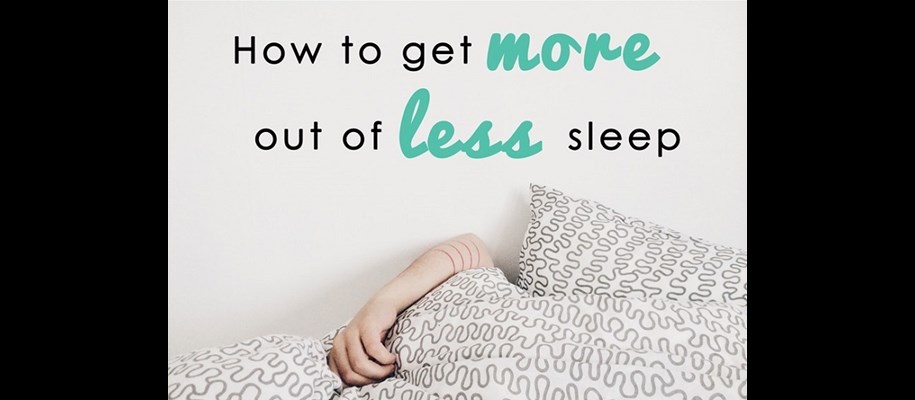
How To Get More Out of Less Sleep
It’s been proven that the amount of time we get to spend in bed is decreasing, meaning that we are spending more time awake and less time asleep than ever before.
While it’s important to get enough sleep, the quality of our sleep is more important than the number of hours racked up. In fact, some research suggests that sleeping too much can be as detrimental to your health as not sleeping enough. Oversleeping is linked to depression, obesity, heart disease and diabetes.
But repeatedly getting less sleep than you need is harmful too. The trick is to find the sweet spot for yourself – it won’t be 8 hours (that’s just an average estimate – everyone is unique in the amount of sleep they need). Once you’ve figured out the right number for you, focus on making sure it’s quality sleep you’re getting.
How to Improve Your Quality of Sleep

Are you in sleep “debt”?
Sleep debt is the difference between the amount of sleep you need and amount the amount you actually get. Every time you sacrifice on sleep, you add to the debt. However, don’t think that sleeping in on the weekends is enough to ‘pay it back’.
“You cannot make up for large sleep losses during the week by sleeping in on weekends any more than you can make up for lack of regular exercise and overeating during the week by working out and dieting only on the weekends”
- James B. Maas, Power Sleep
Dr. Maas, author of Power Sleep, recommends going to bed earlier to help pay off your sleep debt, as this maintains your normal waking time. You could could also consider taking a couple of naps. Read more about sleep debt here.
Once you have paid off any sleep debt, you should aim to go to bed and to get up at the same time every day. Over time this will set your internal clock, making it not only easier to go to sleep and wake up, but also ensuring a better quality of sleep.
TIP: Keep a sleep diary. Note down when you go to bed, when you wake up and how you feel during the day. This will help you to understand your individual patterns of sleep.
Knock 30-60 minutes off of the time you spend ‘trying to sleep’
> Avoid screens (phones, computers, TVs etc.) before bed: The artificial light coming from backlit devices suppresses melatonin – the hormone which regulates sleep.
> Control your mind: your state of mind plays a big role in your ability to sleep (and sleep deeply). If you’re worried or anxious, you will find it harder to get to sleep. There are multiple ways to combat this, the trick is to find one that works for you:
- Reading a book (for no longer than 30 minutes)
- Meditate
- Take a bath
> “4-7-8” breathing trick: Breath in through your nose for 4 seconds, hold your breath for 7 seconds, and exhale through your mouth for 8 seconds. This woman swears by it.
Other ways to improve your sleep quality
We tend to think of sleep as an inconvenience, but sleep has a significant impact on our health and wellbeing. Investing in your sleep quality will make you a happier and healthier person (and stop feelings of fatigue throughout the day).
> Exercise: A study has concluded that people sleep significantly better and feel more alert during the day if they get at least 150 minutes of exercise a week.
> Invest in a good bed: Considering that you use your bed every single night, never underestimate the power of a good mattress/pillows/sheets. You can’t expect to sleep well if you’re not comfortable.
> Take naps: Studies show that 20 minutes of napping in the afternoon provides more rest than 20 minutes more sleep in the morning.
Bad Night? How to Feel More Awake During the Day

Okay, so I appreciate that investing in your sleep can take a long of time, and adjustments, that aren’t easy to implement overnight. I also know that sometimes a bad night of sleep just happens – whether intentional or unintentional. In those instances, you just want to be able to make it through the day and shake the feelings of drowsiness away.
> Eat well: you won’t have energy without the proper fuel.
> Keep busy: Fight off drowsiness with stimulating activities. If you feel yourself getting drowsy or sleepy during the day, counter it by doing something that keeps you busy; washing the dishes, going for a walk or even calling a friend.
> Get some sun: Just 15 minutes in the sun increases your vitamin D levels, which, along with vitamin B is responsible for fighting fatigue.
> Chew gum: Chewing gum can help improve alertness and improve cognitive performance.
Read these 8 Ways to Stop Feeling Tired All the Time for more tips.
Tips to Take Away
- It’s not about the amount of time you sleep for, but about the quality of the sleep you do get.
- A 15 minute nap can save you 2 hours of sleep at night.
- Try to go to bed and wake up at the same time every day.
- If you miss out on sleep, make sure you go to bed earlier to help pay it back.
Latest Blog Posts

Best Beds for Small Rooms: Maximise Your Space
Posted on 27/06/2025
Should You Wash Coverless Duvets?
Posted on 28/05/2025
King vs Super King: Do You Really Need the Extra 30 cm?
Posted on 23/04/2025
7 Tips To Create The Perfect Princess Bedroom
Posted on 14/03/2025